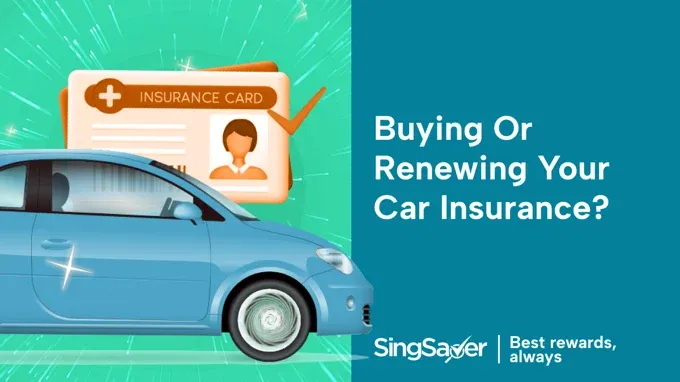How Does Car Insurance Renewal Work in Singapore?
Updated: 12 Dec 2025
Written bySingSaver Team
Team

The information on this page is for educational and informational purposes only and should not be considered financial or investment advice. While we review and compare financial products to help you find the best options, we do not provide personalised recommendations or investment advisory services. Always do your own research or consult a licensed financial professional before making any financial decisions.
Saver Takeaways
-
Renew your car insurance policy online, through your insurer's website, or by contacting your agent.
-
If you've signed up for automatic payments, your policy will typically renew automatically.
-
Before your renewal date, compare quotes from Singapore's best car insurance providers to ensure you're getting the best deal.
Car insurance renewal is usually a straightforward process. In most cases, it happens automatically. When your policy is about to expire, your insurer will send you a notice with an updated premium. If you've enrolled in automatic payments, your insurer will charge the new premium to your account, and your coverage will continue uninterrupted.
But there's more to car insurance renewals than just letting them renew automatically. Let's dive in and explore the details.
Compare and Find the Best Car Insurance Quotes
SingSaver helps you discover car insurance plans that best fit your and your family's needs. Benefit from SingSaver's exclusive offers and discounts today!
How to renew your car insurance in Singapore
Car insurance policies, like most other insurance plans in Singapore, typically have a term of six or 12 months. As you approach the end of your policy term, your insurer will send you a renewal notice with updated terms and premiums. It's important to review this notice carefully, as some aspects of your coverage or premium may change.
Before you proceed with your car insurance renewal, here are five essential things to check:
-
Policy details: Ensure all your personal and vehicle information is up to date, including your address, contact details, and car registration number.
-
Coverage level: Review your current coverage level and decide if it still meets your needs. Consider factors like the age and value of your car, your driving habits, and your budget. You might need to adjust your coverage if your circumstances have changed.
-
Discounts: Check if you're eligible for any no-claim discounts (NCD) or loyalty rewards. These can significantly reduce your premium.
-
Claims history: Verify that your claims history is accurate and up to date. Any discrepancies could affect your premium or coverage.
-
Customer service and claims process: Review the insurer's customer support options and the ease of making a claim. Consider their responsiveness, helpfulness, and overall customer satisfaction ratings.
It's also crucial to consider your car's Certificate of Entitlement (COE) when renewing your insurance. If your COE is expiring soon, your insurer may adjust your premium or coverage options. Renewing your COE might also affect your insurance eligibility or premiums, so it's essential to factor this into your renewal decision.
» Read more: 5 factors that determine your car insurance premium
You can choose to renew your policy with your current insurer or explore options from other providers. Assess the types of coverage offered and compare premiums from different insurers to find the most competitive rates. Beyond pricing, look for additional benefits that can enhance your coverage, such as roadside assistance, medical coverage, or personal accident benefits. Research the insurer's claims process and customer service reputation to understand how easy it is to file a claim and how responsive their customer service is. Reading online reviews and comparing customer satisfaction ratings can give you valuable insights into the insurer's reliability and service quality.
Your premium may change when you renew your car insurance due to several factors, including your driving history, claims record, and the age of your vehicle. It's also worth checking if you're eligible for any loyalty discounts if you've been with the same insurer for a certain period. These discounts can help you save money on your premium. Keep these in mind even when you compare quotes from Singapore’s best car insurance providers.
Should you decline renewal of your car insurance renewal?
If you've found a better car insurance policy or are unhappy with your current insurer's renewal terms, you can decline the renewal.
Contact your insurer and inform them that you won't be renewing your policy. Check with them if you need to submit a formal cancellation request or if a phone call or email is sufficient. If you're switching to a new insurer, ensure you purchase a new policy before your current policy expires to avoid a lapse in coverage.
You can compare car insurance quotes online or through an insurance broker to find the best deal.
Remember, you can switch car insurance providers at any time. If you find a better deal or your needs change, you can cancel your existing policy and purchase a new one. Just be aware that you might incur a cancellation fee if you cancel mid-term.
It's important to be proactive when declining a car insurance renewal, especially if you have automatic payments set up. Otherwise, your insurer might automatically charge you for the new premium.
If you're unsure about the process or want to explore your options for buying or renewing your car insurance, consider reaching out to an insurance advisor for guidance.
Can your auto insurance renewal be rejected by my insurance provider?
Yes, car insurance providers in Singapore can refuse to renew your policy under certain circumstances. This typically happens if you've made several claims recently have a poor driving record, or if there have been significant changes in your risk profile. Non-payment of premiums can also lead to nonrenewal or cancellation of your policy.
Cancellation
Cancellation means your insurer terminates your policy before the end of its term. This can happen if you fail to pay your premiums, have your driver's license suspended, or are involved in serious driving offences. Cancelling your policy before its renewal date can result in penalties or make it harder to find affordable insurance in the future.
-
Non-payment of premiums: Failing to pay your premiums on time can lead to policy cancellation.
-
Driving offences: Serious driving offences, such as DUI convictions or driving with a suspended license, can also result in cancellation.
-
Insurance fraud: Providing false information or making fraudulent claims can lead to your policy being cancelled.
Nonrenewal
Nonrenewal occurs when your insurer decides not to renew your policy at the end of its term. This can happen if you've made too many claims, have a poor driving record, or if the insurer has changed its underwriting guidelines. If your policy is not renewed, you'll need to find a new insurer, which might result in higher premiums or limited coverage options.
-
Multiple accidents: If you've had multiple accidents, especially if you were at fault, your insurer may decide not to renew your policy.
-
Excessive claims: Filing too many claims can also lead to nonrenewal.
-
Changes in insurer's offerings: Your insurer may decide to offer fewer policies in your area or stop offering the type of insurance you had purchased, leading to nonrenewal.
What happens to my car insurance if I don’t renew my policy?
If you don't renew your car insurance policy on time, your coverage will lapse, and you'll be driving without insurance. This can lead to serious consequences in Singapore, including fines, penalties, and even license suspension. If you're involved in an accident without insurance, you'll be personally liable for any damages or injuries, which could result in significant financial losses.
Additionally, a lapse in coverage can make it more difficult and expensive to get car insurance in the future, as insurers may view you as a higher-risk driver.
» Read more: Cheapest car insurance plans in Singapore
Can I renew my car insurance after it expires?
It's best to renew your car insurance policy before it expires to avoid a lapse in coverage. However, if you miss the renewal deadline, some insurers in Singapore may offer a short grace period. Even with a grace period, you might experience a lapse in coverage between the expiration date and the renewal date, leaving you uninsured during that time.
If you can't renew your existing policy, you can always purchase a new one, either with your current insurer or a different provider. Just be aware that a lapse in coverage could lead to higher premiums in the future.
Compare all the best insurance providers in one place.
Not sure which insurance provider you should opt for? SingSaver has the latest information on all of Singapore’s best car insurance providers—from coverage details to benefits.
Stay ahead in everything finance
Subscribe to our newsletter and receive insightful articles, exclusive tips, and the latest financial news, delivered straight to your inbox.
Find your ideal car loan in Singapore
Compare competitive car loan rates from leading banks and financial institutions. Discover flexible financing options tailored to your needs.
About the author
SingSaver Team
At SingSaver, we make personal finance accessible with easy to understand personal finance reads, tools and money hacks that simplify all of life’s financial decisions for you.

